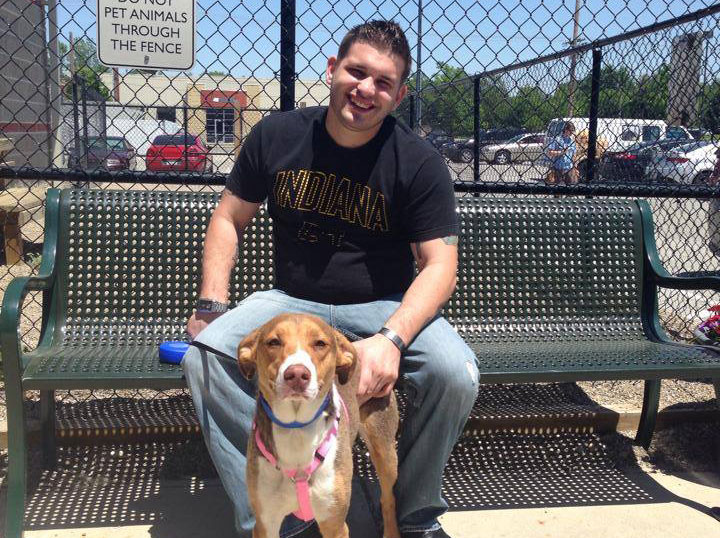By Navar Watson
Everyone is born with a moral code, Bloomington resident Megan Morseth said. But when someone serves in war, that moral code is broken.
She said her husband, Justin, experienced events “on a level most human beings never do and hopefully never should.”
An Iraq veteran, he came home a completely different man.

“(Post-Traumatic Stress Disorder) changes the entire dynamic of the family,” Morseth said. “The family has to essentially mourn the loss … of the man or woman that went to combat and … reintroduce (themselves) to the man or woman who came home.”
But through the help of Samson, their rescue Husky, Justin found a new means of support.
His bond with Samson inspired the couple to start a pets-for-vets program in Indiana. They sent letters to more than 50 different shelters with their idea. The Humane Society for Hamilton County was the only shelter to say “yes.”
After receiving an initial grant from the Tony Stewart Foundation in Indianapolis, Pets Healing Vets officially began in May 2012 and has matched 16 veterans and rescue dogs since.
The program is completely free, HSHC Executive Director Rebecca Stevens said. The $25 adoption fee is waived, and the dogs come spayed or neutered and micro chipped. Training and medical needs are also provided, if the veteran cannot afford them.
Iraq and Afghanistan veteran Greg Sexton of Noblesville first heard of the program from a brochure at the VA Hospital in Indianapolis. A victim of PTSD and Traumatic Brain Injury, he decided to try it.
The Humane Society allowed him to pick from five dogs. The fifth one, a black lab named Patton, immediately bonded with him.
“She knew there was a problem with me, so she just pretty much stuck with me,” Sexton said. “That’s how she’s been ever since.”
Stevens said rescue dogs are especially good companions for veterans because they share some of the same feelings of abandonment and anxiety. When a veteran adopts a rescue dog, the dog picks up on this connection.
“Rescues know that they’ve been rescued,” Morseth said. “They have an appreciation for that … They want to love and they want to help.”
Dogs are smart, Sexton said. They have a sense where they can understand “what’s wrong with a human.”
The Morseths now have two dogs: Kobi, a Great Pyrenees mix, and Lucy, a Great Dane mix. These dogs serve as a “buffer” between Justin and the rest of the family, Morseth said. When Justin’s emotions build up, he can release them to the dogs.
“Dogs aren’t judgmental,” Morseth said. “They don’t have opinions.”
This allows veterans to tell them stories and feelings they could never tell their family. After Justin releases these emotions, Morseth said she see glimpses of the “old” Justin.
Each dog serves a different purpose for each veteran, Stevens explained. The HSHC tries to match the right dog based on a veteran’s specific needs. For example, many veterans suffer from hypervigilance, meaning they never feel safe. With this, Stevens said the shelter pairs them up with a calm, watchful dog – giving them an extra set of eyes.
Other dogs motivate veterans to go outside as some veterans become reclusive after combat, and the dogs bring them out onto the social scene. The response the HSHC receives from the veterans is the best part of the whole thing, Morseth said.
In one case, a veteran told Morseth that his dog “gave him something to live for.”
Though the humane society is a no-kill shelter, the veterans are saving the pets as well, Stevens said. They are still finding them homes.
“It’s a win-win for everybody,” she said.
The shelter recently considered expanding its program to police officers and firefighters, after members of community suggested that emergency services personnel experience similar trauma.
The HSHC has opened Pets Healing Vets to local police and fire departments on a trial-and-error basis. The adoption process remains confidential, Stevens said, and depending on the response, the shelter will decide whether or not to continue this expansion.
The effects of PTSD are permanent, Morseth said. It’s a second battle the veteran has to face. Though it never leaves, it can be lessened. Sexton said anyone struggling with PTSD should consider the program, especially if he or she is unwilling to get help through the VA hospital.
He called PTSD the “hidden wound.” Whereas some veterans come home with missing limbs and visible wounds, others return with physiological ones – and they’re just as bad.
“If you have PTSD, get help,” Sexton said. “Don’t bottle it all up, (and) don’t take it to your grave … Don’t let it win.”
By the numbers
• More than 300,000 veterans suffer from Post-Traumatic Stress Disorder and more than 320,000 suffer from Traumatic Brain Injury, which has become known as the “signature wound” of the Iraq and Afghanistan wars. There is no FDA-approved medication for either disease.
• Veterans are more than twice as likely to commit suicide than civilians and approximately 18 veterans commit suicide every day.
• While there are similar programs around the nation, Pets Healing Vets is the only program of its kind supporting veterans residing in Indiana.
Source: www.petshealingvets.com



